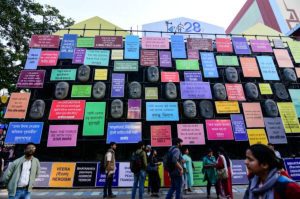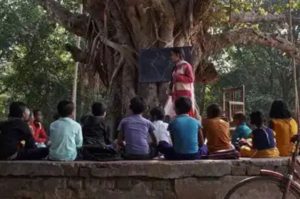KIFF 2024 — What was meant to be a triumphant celebration of cinema turned into a heated controversy at the 2024 Kolkata International Film Festival (KIFF), as a critically acclaimed film became the subject of intense scrutiny by the Central Board of Film Certification (CBFC), igniting debates around censorship, freedom of speech, and creative expression.
The film in question — reportedly based on contemporary political and social issues — faced what insiders are calling “soft censorship”: screening delays, suggested edits, and bureaucratic pushback, despite being officially selected for KIFF’s Panorama section.

The Film at the Center of the Storm
While officials have refrained from naming the film publicly, sources confirm that it is a Bengali-language independent feature titled “Bhoomi”, directed by Arghya Sen, and set against the backdrop of post-pandemic rural displacement and land rights agitation.
“Bhoomi” narrates the story of a tribal family torn between traditional farming and encroaching industrial projects, subtly echoing real-life political clashes over land acquisition in Bengal and Jharkhand.


Censorship Controversy: What Happened?
Although the film had been approved for festival screening under the CBFC’s limited exemption for non-commercial screenings, the board reportedly raised objections to:
- Use of archival footage from real-life protests
- Dialogue referring to “state-sponsored violence”
- Scenes showing police suppression and media silence
- “Allegorical” portrayal of political leadership
According to festival insiders, a CBFC advisory panel unofficially requested the organizers to “reconsider the timing and content.” The film was suddenly pulled from its first screening slot and delayed by two days.
KIFF 2024: Filmmaker Speaks Out
Director Arghya Sen, while remaining composed in media interactions, issued a strong statement at a press briefing:
“Cinema must question power, not bow before it. If films can no longer speak uncomfortable truths at a film festival, where else can they?”
Sen denied making the film with any partisan political intent, asserting that “Bhoomi is about people, not parties.”


Artists and Activists React
The incident sparked strong reactions from the film community, with many calling it “a dangerous precedent” for festival programming. Notable reactions include:
- Aparna Sen, filmmaker: “This is not just about one film. This is about artistic space being systematically shrunk.”
- Anirban Bhattacharya, actor: “Are we going to let bureaucrats decide what a citizen should feel or watch?”
- Shabana Azmi, veteran actress: “This recalls the Emergency days when dissent was disallowed under the veil of national interest.”
Festival Organizers Caught in the Crossfire
KIFF authorities remained largely diplomatic, stating they were “working with all stakeholders to ensure a respectful and legally compliant festival.”
A festival spokesperson said:
“We respect both creative liberty and institutional guidelines. We hope such differences can be resolved without compromising cinematic integrity.”
Yet, leaked internal emails reveal that pressures may have come from political quarters, suggesting that state officials were wary of “negative optics” during an election-sensitive year.
Legal and Regulatory Background
Under Indian law:
- Films screened publicly must have CBFC certification.
- Exemption is granted for festivals under Rule 11 of the Cinematograph Act, allowing uncensored films to be shown if preceded by a disclaimer and non-commercial in nature.
- However, state or central governments can intervene under public safety or moral grounds — a grey area often exploited.
In 2022, filmmaker Leena Manimekalai faced police cases for a festival poster; in 2023, Anand Patwardhan’s film was dropped from an international festival due to “security” concerns.
Timeline of Events
| Date | Event |
|---|---|
| July 10 | KIFF 2024 opens at Nandan, Kolkata |
| July 12 | “Bhoomi” scheduled for first screening |
| July 11 (evening) | CBFC flags concern over content |
| July 12 (morning) | Screening “postponed” without official reason |
| July 14 | Film rescheduled with “minor cuts” and a disclaimer |
| July 15 | Panel discussion held: “Censorship in the Age of Polarization” |
Voices from the Ground
Audience member at KIFF:
“We were looking forward to Bhoomi. It had real issues, not fantasy. Why suppress that?”
A film student from FTII:
“This was supposed to be a learning platform. But it seems even reality needs a censor here.”
Volunteer staff:
“We were instructed not to speak about why the film got pulled. It felt political.”
Wider Implications
This incident at KIFF is emblematic of a growing concern in India’s cultural spaces:
- Shrinking of artistic freedom in government-affiliated events
- Over-regulation of independent cinema
- Blurring of lines between national interest and political convenience
In 2021, the I&B Ministry merged several film bodies into a single entity under tighter central oversight, raising alarms about centralization and censorship.
Related External Links
- Central Board of Film Certification (CBFC)
- KIFF Official Website
- Indian Cinematograph Act Overview (PRS India)
- FICCI Frames Position on Film Censorship
Expert Opinions
Prof. Meenakshi Menon, Media Ethicist at JNU:
“Censorship today is not always a ban. It can be delay, silence, suggestion — and that’s more dangerous because it’s invisible.”
Ananda Roy, former KIFF Jury Member:
“Festivals are not state propaganda platforms. They are sanctuaries of truth-telling.”
Legal Viewpoint:
“Unless the film incites violence, under the Cinematograph Act’s festival clause, it should not be stalled,” said advocate Rituparna Dey.
What’s Next?
Following media pressure, KIFF may release a policy clarification about how films are curated and vetted. Several other filmmakers are now contemplating independent digital releases.
Arghya Sen has already hinted at an OTT release for “Bhoomi,” alongside student screenings and Q&A sessions across campuses in India.
Conclusion
The KIFF censorship controversy isn’t an isolated incident — it reflects a larger struggle between creativity and control. As Bengal positions itself as India’s cultural capital, it must also ask whether cultural integrity can survive without freedom of expression.
Also read: Home | Channel 6 Network – Latest News, Breaking Updates: Politics, Business, Tech & More

